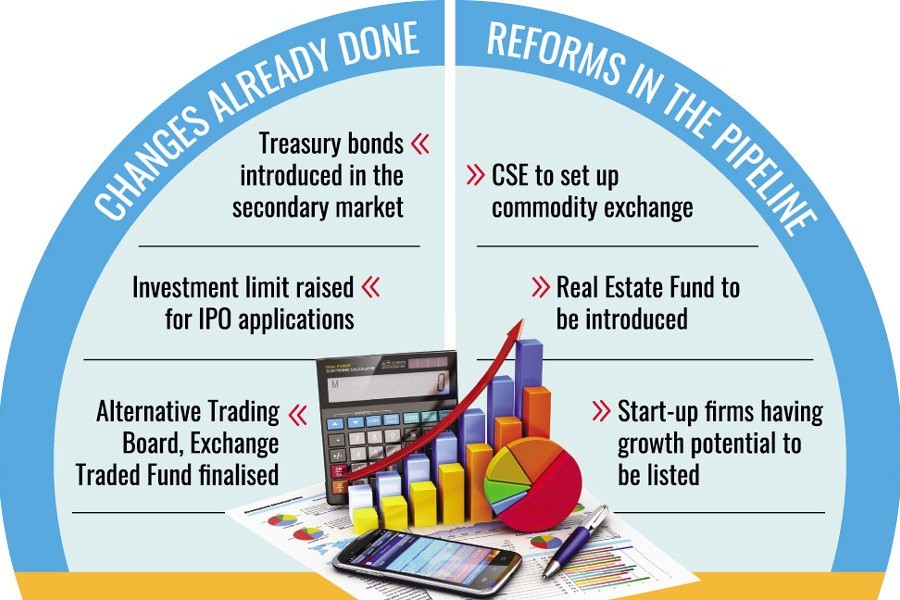
Changes brought by bearish market may bear long-term fruits
BABUL BARMAN | Monday, 2 January 2023

The stock market passed a rough patch last year. But the changes that the regulator felt forced to make to bring some sort of stability in the volatile market will bear fruits not only in 2023 but also in many more years to come.
The war-induced economic gloom that stymied the growth of business and the market heightened the need for product diversification.
The biggest ever move was to introduce treasury bonds in the secondary market after it had been planned for more than a decade. The bonds expanded investment opportunities for retail investors who had nothing but stocks and mutual funds to put their money on.
As many as 250 treasury bonds worth Tk 3,168 billion of market capitalization have become new and risk-free investment schemes.
As stocks plunged, biting away a large pie of the market capitalization, T-bonds drove up the value by a remarkable 40 per cent in 2022.
Enam Ahmed Hasan, portfolio manager of BD Finance Capital, said, "We have been insisting on product diversification for years. The moves that were finally taken in 2022 will help start sustainable development of the market."
The Bangladesh Securities and Exchange Commission had already approved a commodity exchange to be set up under the Chittagong bourse, subject to ensuring consumer rights.
The Chittagong Stock Exchange (CSE) has been preparing to launch the country's first commodity exchange in collaboration with project consultant Multi Commodity Exchange of India (MCX).
A commodity exchange is a marketplace where producers, traders and users of pre-selected commodities meet for buying and selling.
In modern days, they interact on electronic trading screens just how buyers and sellers do in the stock market.
The CSE also got strategic investor -- ABG Ltd after nine years of demutualization. ABG, a concern of Bashundhara Group, acquired 25 per cent stake of the port city bourse, with Tk 2.40 billion.
More products, such as alternative trading board (ATB) and Real Estate Investment Trust (REIT) have been planned and designed to diversify the Dhaka bourse.
Apart from bringing new products, the securities regulator also tried to streamline the market to protect the interests of investors.
Throughout 2022, large fines were imposed on errant investors for breaching securities rules, manipulation of stock prices for example.
The rules tied to the distribution of bonus shares by listed companies have been tightened.
According to the revised rules, companies failing to pay at least 10 per cent cash dividends for two consecutive years will require prior approval from the BSEC for the disbursement of stock dividend.
Besides, no company can issue bonus shares within three years of listing on the stock markets using the money raised through the initial public offering, rights issue, and RPO.
The rules are applicable for SME companies as well.
Facing the acute liquidity crisis, the regulator also hiked the mandatory investment from Tk 20,000 to Tk 50,000 for individual investors while applying for IPO shares.
The investment amount has been increased for non-resident Bangladeshis too from Tk 50,000 to Tk 100,000.
The move, as anticipated, will nudge general investors towards long-term investments.
Institutional investors, such as merchant banks and brokerage houses, require minimum investments of Tk 30 million on securities increased from Tk 10 million to qualify for IPO subscription.
The limit for approved pension funds, recognised provident funds and approved gratuity funds went up to Tk 15 million from Tk 5 million.
Meanwhile, plans of two listed firms to exit the market have been approved on the grounds that funds of individual investors have remained stuck for years. The companies' recurrent losses made the assets untradeable.
Six other companies are undergoing an exit process on condition that they will pay back investors based on net asset value per share or face value or the latest market price, whichever is higher.
All these efforts were aimed at restoring investors' confidence amid a long bearish spell when investors were put off by discouraging macroeconomic signs.
Foreign investors have kept pulling out of the market as investments elsewhere promised higher profit against the backdrop of the taka losing its value against the dollar.
M Shaifur Rahman Mazumdar, managing director (Acting) of the Dhaka Stock Exchange (DSE), said he is optimistic that the proactive regulatory measures and inclusion of new products will help the market recover this year.
The projected gain in the global economy will rejuvenate the market further, he added.
More regulatory measures are in the pipeline, which are expected to be positive for the capital market.
An independent order management system will come into play to facilitate the trading of T-bonds, said Mr Mazumdar.
The Dhaka Stock Exchange is also planning to establish a state-of-the-art data centre to strengthen the technological backbone behind the day-to-day trading. It will also boost trading via the mobile app.
The securities regulator is formulating rules to allow startups having high growth potentials to be listed on the country's stock exchanges.
The introduction of Real Estate Investment Trust (REIT) is also in the final stage. A REIT is a trust that uses pooled capital of investors to purchase and manage income-producing real estate properties.